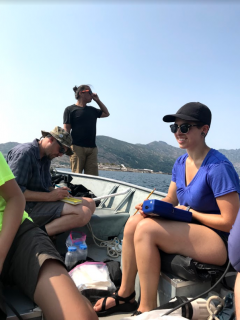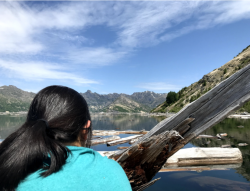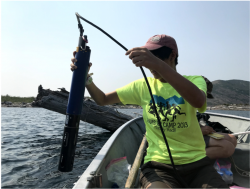by Rachel Liu, Department of Biology, University of Washington
As a 21-year-old college student, I have spent most of my life in classrooms. While classroom learning is important, field work and hands-on research has benefitted me enormously. The opportunity I had to work with my great mentors and fellow student researchers provided me with invaluable experience that simply can’t be gained through classroom learning. I had the amazing chance this past summer to participate in some hands-on research on Mt. St. Helens investigating algae in Spirit Lake.
Sparking interest
College is a great place to dabble, explore fields, and find your passion. But at thousands of dollars per quarter, the pressure to find your calling and select your major quickly is enormous. My own department has so many specialized classes, it seems impossible to find what I want to do. Doing field work and research is a great way to test the waters and find out what you’re interested in.
Before last summer, I had no limnological knowledge. I had worked mainly with terrestrial plants, but was looking for an opportunity to gain some field experience. As a result of such opportunity, I wanted to learn more. The next school year I took a limnology course. My experience as a researcher helped me better understand the concepts in class. Now I volunteer regularly doing surveys on Lake Washington, and I’m thinking of pursuing a career related to aquatic research or management.
Delving deeper
University can be great at introducing you to important fundamental information. However, it doesn’t quite compare to the work you do during research. The fast pace in the classroom, while great for learning broadly, can make it hard to develop a deeper understanding of the topics covered. When you are out in the field collecting data, you have a better sense of where statistics and results come from. Field work helps you think critically about the data you are receiving in real time. You learn what you need to look for and how that is important in your study. Field work also gives you an appreciation for all the hard work and dedication researchers and analysts put into gathering data.
Making a difference

The best thing about field work and research is making a difference. It is exciting and motivating to apply classroom knowledge and feel like you are participating in the grand scheme of things. Investigating real world problems allows you to get a good look at what a career in this field would look like. Field work is exciting! Camping, hiking, and swimming while you work is like a dream job. Of course, research can also mean being in the lab at a microscope and doing computer work most of time, but you still get to look at a host of interesting organisms. Working with your mentors and other students, you learn accountability and responsibility in a different way. Now it isn’t just your grade that is being affected, but the results of a group effort.
Field work and research for students — especially undergraduates who might not have everything figured out yet — is a fantastic opportunity. You get to meet other wonderful students, all equally excited to learn. You get to develop lasting relationships with your mentors who are a wealth of knowledge, and you get to travel and experience being a part of the scientific community.











